外研版九年级上册Module 2 Public holidays Unit 1 课件 (共38张PPT,内嵌音频)
文档属性
| 名称 | 外研版九年级上册Module 2 Public holidays Unit 1 课件 (共38张PPT,内嵌音频) |
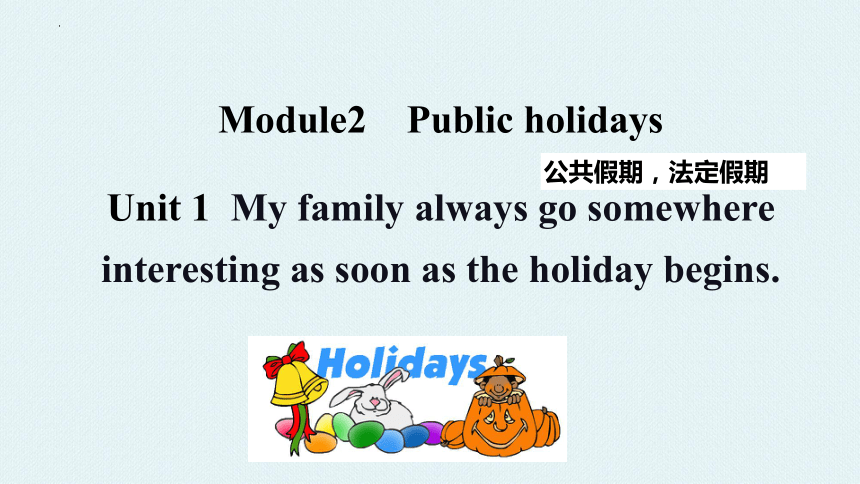
|
|
| 格式 | pptx | ||
| 文件大小 | 14.9MB | ||
| 资源类型 | 教案 | ||
| 版本资源 | 外研版 | ||
| 科目 | 英语 | ||
| 更新时间 | 2024-09-13 00:00:00 | ||
图片预览

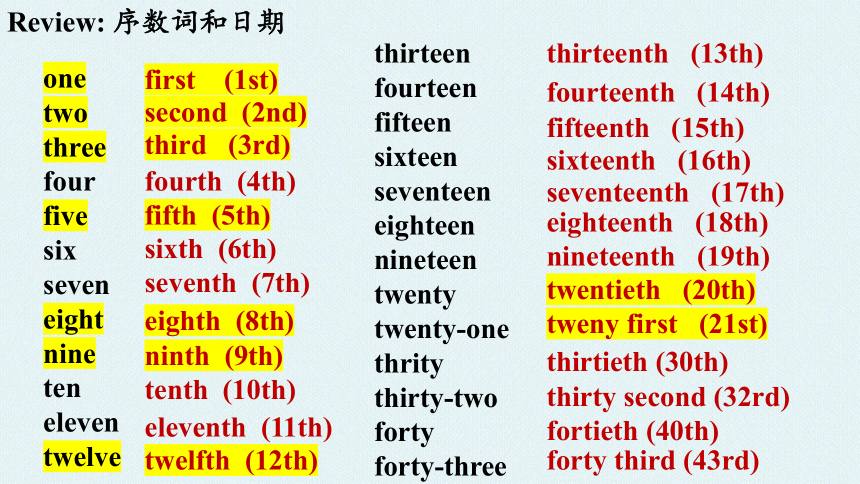
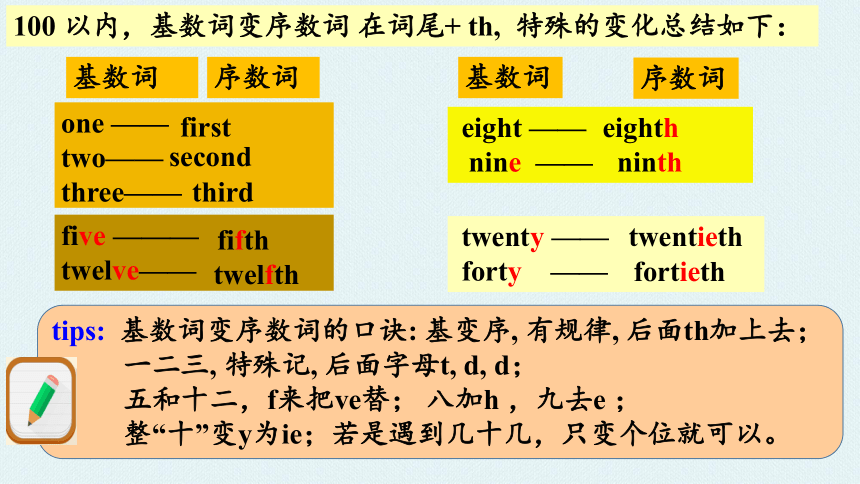

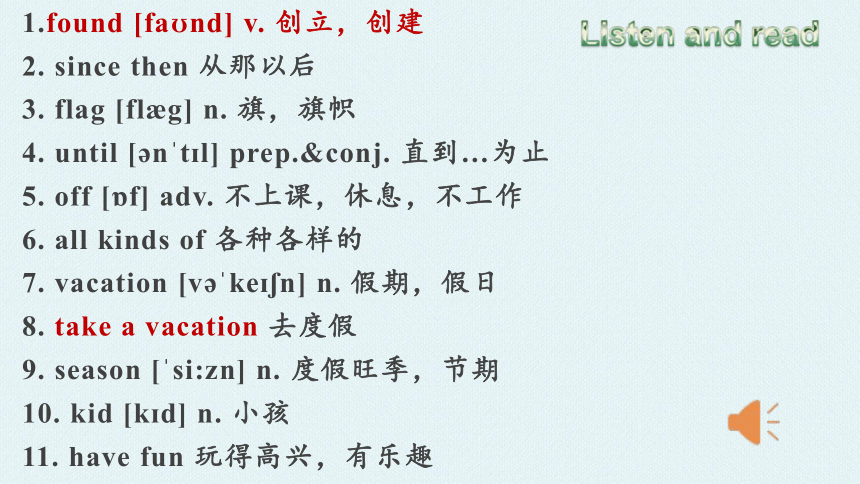
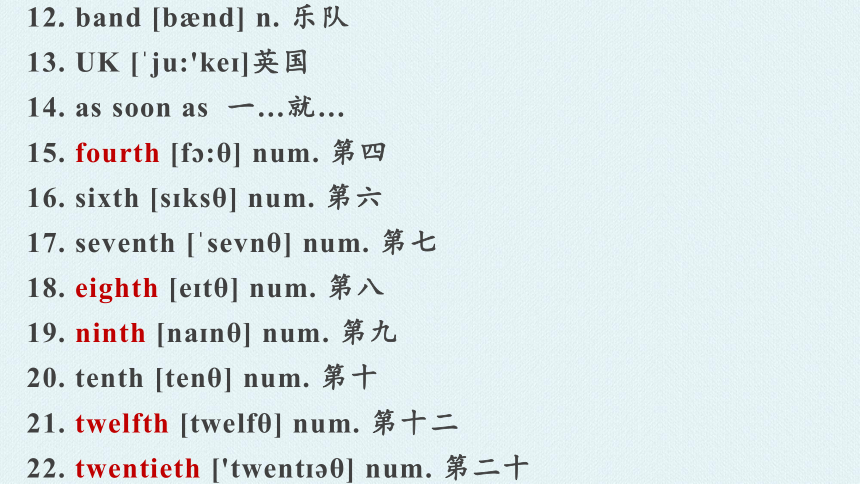

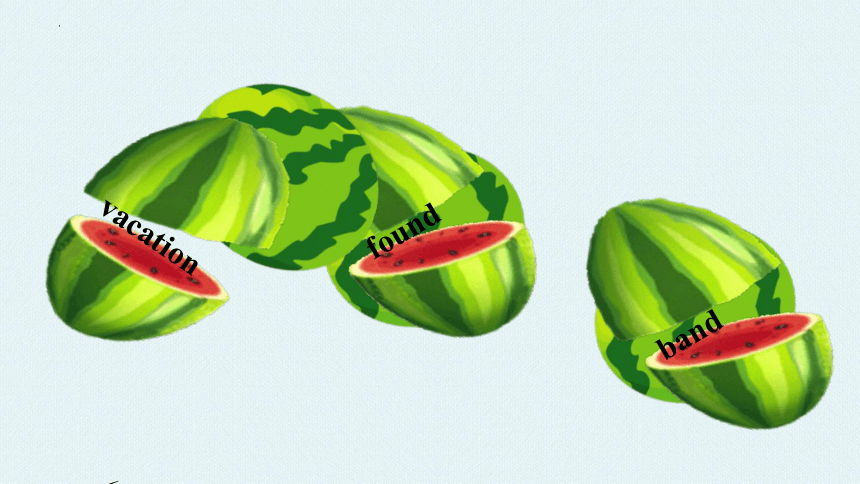
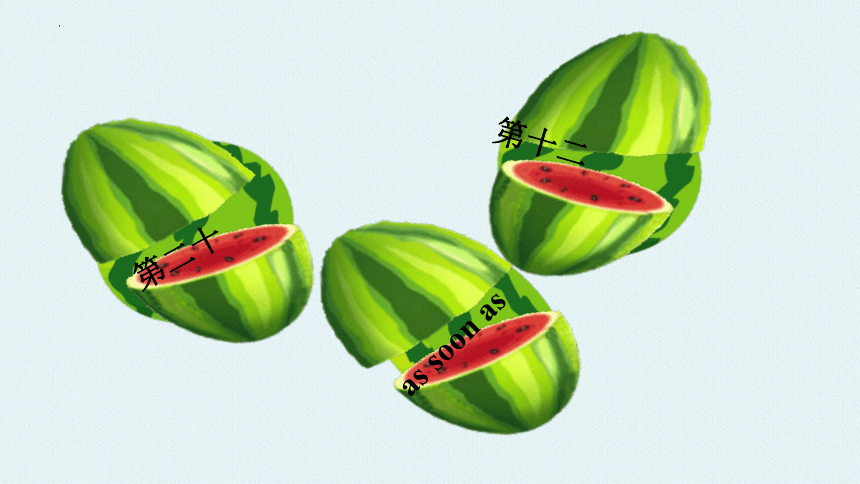
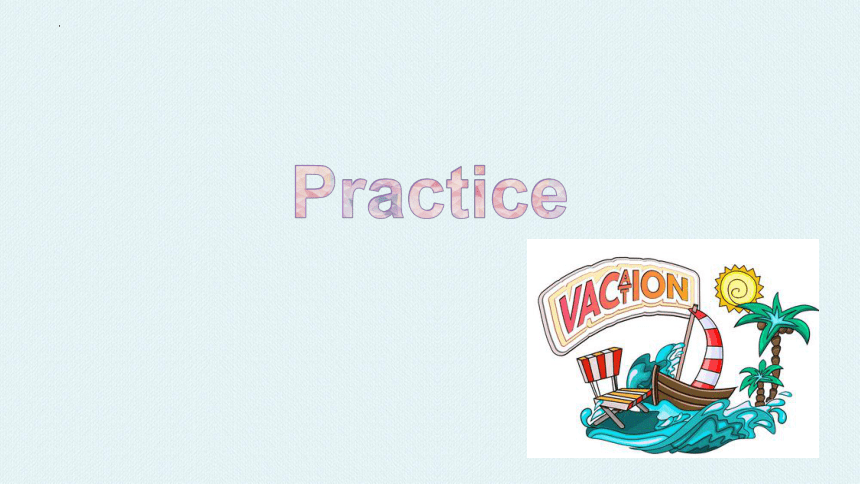
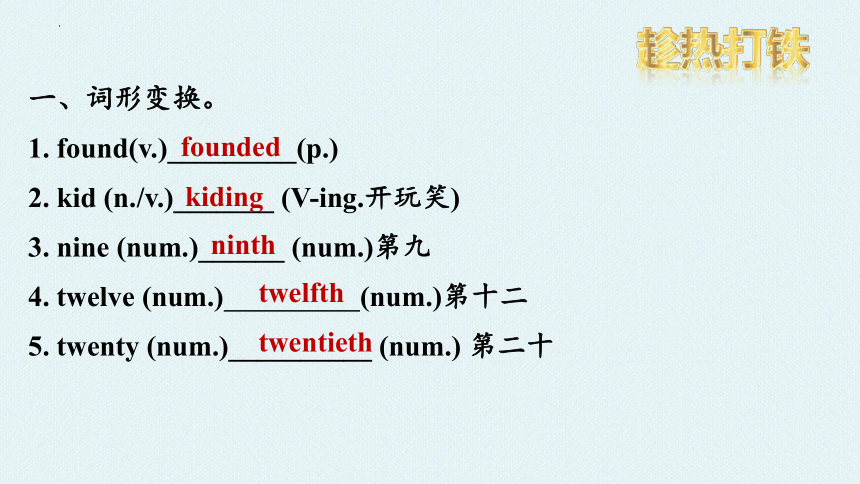
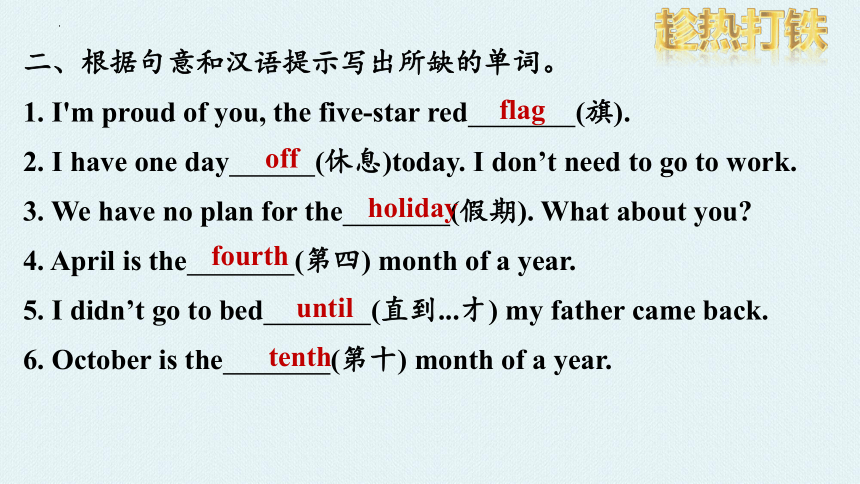
文档简介
(共38张PPT)
Module2 Public holidays
Unit 1 My family always go somewhere interesting as soon as the holiday begins.
公共假期,法定假期
Review: 序数词和日期
one
two
three
four
five
six
seven
eight
nine
ten
eleven
twelve
thirteen
fourteen
fifteen
sixteen
seventeen
eighteen
nineteen
twenty
twenty-one
thrity
thirty-two
forty
forty-three
first (1st)
second (2nd)
third (3rd)
fourth (4th)
fifth (5th)
sixth (6th)
seventh (7th)
eighth (8th)
ninth (9th)
tenth (10th)
eleventh (11th)
twelfth (12th)
thirteenth (13th)
fourteenth (14th)
fifteenth (15th)
sixteenth (16th)
seventeenth (17th)
eighteenth (18th)
nineteenth (19th)
twentieth (20th)
tweny first (21st)
thirtieth (30th)
thirty second (32rd)
fortieth (40th)
forty third (43rd)
100 以内,基数词变序数词 在词尾+ th, 特殊的变化总结如下:
基数词
序数词
one ——
two——
three——
first
second
third
基数词
序数词
five ———
twelve——
fifth
twelfth
eight ——
nine ——
eighth
ninth
twenty ——
forty ——
twentieth
fortieth
tips: 基数词变序数词的口诀: 基变序, 有规律, 后面th加上去;
一二三, 特殊记, 后面字母t, d, d;
五和十二,f来把ve替; 八加h ,九去e ;
整“十”变y为ie;若是遇到几十几,只变个位就可以。
日期表达方式
May the nineteenth
the nineteenth of May
May 19th
19th May
What's the date today
2023年
5月
Review: 序数词和日期
1.found [fa nd] v. 创立,创建
2. since then 从那以后
3. flag [fl g] n. 旗,旗帜
4. until [ n t l] prep.&conj. 直到…为止
5. off [ f] adv. 不上课,休息,不工作
6. all kinds of 各种各样的
7. vacation [v ke n] n. 假期,假日
8. take a vacation 去度假
9. season [ si:zn] n. 度假旺季,节期
10. kid [k d] n. 小孩
11. have fun 玩得高兴,有乐趣
Listen and read
12. band [b nd] n. 乐队
13. UK [ ju:'ke ]英国
14. as soon as 一…就…
15. fourth [f :θ] num. 第四
16. sixth [s ksθ] num. 第六
17. seventh [ sevnθ] num. 第七
18. eighth [e tθ] num. 第八
19. ninth [na nθ] num. 第九
20. tenth [tenθ] num. 第十
21. twelfth [twelfθ] num. 第十二
22. twentieth ['twent θ] num. 第二十
单词大闯关
found
band
vacation
as soon as
第十二
第二十
Practice
趁热打铁
一、词形变换。
1. found(v.)_________(p.)
2. kid (n./v.)_______ (V-ing.开玩笑)
3. nine (num.)______ (num.)第九
4. twelve (num.) (num.)第十二
5. twenty (num.)__________ (num.) 第二十
ninth
kiding
founded
twelfth
twentieth
趁热打铁
二、根据句意和汉语提示写出所缺的单词。
1. I'm proud of you, the five-star red (旗).
2. I have one day (休息)today. I don’t need to go to work.
3. We have no plan for the (假期). What about you
4. April is the (第四) month of a year.
5. I didn’t go to bed (直到...才) my father came back.
6. October is the (第十) month of a year.
holiday
off
flag
tenth
fourth
until
趁热打铁
三、用括号中所给词的适当形式填空。
1. When was the PRC (found)
2. During the (twenty) century, English became a world
language.
3. —Are you __________(kid) me —No, I am serious.
4. We often have fun (learn)English.
5. Today is Lisa’s (twelve) birthday. Let’s sing a birthday song for her!
kidding
twentieth
founded
learning
twelfth
Brainstorming
What public holidays do you know in China or in western countries
Public holidays in China
Public holidays in western countries
Mid-Autumn Festival
Lantern Festival
National Day
Spring Festival
Dragon Boat Festival
Easter
Christmas Day
Independence Day
Halloween
Thanksgiving
Day
Labour Day
A: What date/When is New Year’s Day
B: It’s on January the first./
It’s on the first of January.
1.1
12.25
“1.1”
“5.5”
6.1
“8.15”
5.1
10.1
Let’s Practise!
正月初一:on the first (day) of the first month of Chinese lunar calendar
Spring Festival
on January 1st in Chinese calendar
put up spring couplets
have a family reunion dinner
eat jiaozi
staying up late on New Year's Eve
burning firecrackers
watch the CCTV New Year’s Gala
/ k pl ts/
/ fa kr k z/
/ ɡɑ l /
盛会;庆典
Festival activities 节日活动
(团圆饭)
(守岁)
放鞭炮
China’s National Day
on October 1st
The People’s Republic of China was founded on 1st October 1949.
People have celebrated the National Day since then.
There are flowers and flags everywhere, and we have a three-day holiday.
Independence Day
on 4th July
American people have celebrated it since 1777.
It’s a public holiday, but they only have one day off.
On that day, there are all kinds of holiday activities.
The George Washington Lead American people fight against English colonists.
/ kɑl n st/
May Day/Labour Day.
on 1st May in China.
We have a three-day holiday.
We have three days off.
Labour Day is a public holiday in many countries in honour of labour. But people in different countries celebrate Labour Day on different dates.
Listen and Complete the sentences with the dates of the following holidays in China, the UK and the US.
1. Labour Day in China is on__________.
2. May Day in the UK is on ______________________
3. Labour Day in the US is on___________________________
1st May
the first Monday in May
the first Monday in September
1
2
3
(Lingling, Tony, Daming and Betty are talking about different public holidays.)
Task 1 Listen for the main idea: Circle the holidays you can hear.
New Year's Day
Independence Day
China's National Day
Christmas Day
Dragon Boat Festival
Listen to the tape and complete the table.
China US
Holiday
Date
Duration
Ways of celebration
Year the celebration started
China’s National Day
Independence Day
1st October
4th July
one day
in 1777
in 1949
flowers and national flags
American flags, have a picnic somewhere nice, watch bands play music
three days
Tony: The First of October is China’s National Day, isn’t it, Lingling
Lingling: Yes. The People’s Republic of China was founded on 1st October 1949. People have celebrated the National Day since then. There are flowers and national flags everywhere, and we have a three day holiday.
Tony: Do you have any plans for the holiday this year
Lingling: Yes. My parents and I are going to visit some friends in Shandong Province and we’ll stay there until the end of the holiday. While we’re staying with our friends, we’re going to spend one day in Qingdao.When is your national day, Betty
Betty: Our national day is called Independence Day. It’s on 4th July. We’ve celebrated it since 1777. It’s a public holiday, but we only have
one day off. On that day, there are all kinds of holiday activities. It’s the start of the vacation season, and most people take a vacation sometime in July or August.
Lingling: And is there anything special on that day
Betty: Well, you can see American flags everywhere. We usually have a picnic somewhere nice. Kids, have great fun. We also watch bands play music in public parks.
Daming: Do you have a national day in the UK, Tony
Tony: No, we don’t―we celebrate Christmas with a two day holiday. And my family always go somewhere interesting as soon as the holiday begins.
Tony: The First of October is China’s National Day, isn’t it, Lingling
Lingling: Yes. The People’s Republic of China was founded on 1st October 1949. People have celebrated the National Day since then. There are flowers and national flags everywhere, and we have a three day holiday.
Tony: Do you have any plans for the holiday this year
Lingling: Yes. My parents and I are going to visit some friends in Shandong Province and we’ll stay there until the end of the holiday. While we’re staying with our friends, we’re going to spend one day in Qingdao.When is your national day, Betty
Betty: Our national day is called Independence Day. It’s on 4th July. We’ve celebrated it since 1777. It’s a public holiday, but we only have
be founded成立于
自从
国旗
一个三天的假期
反义疑问句
构成:陈述句+附加问句,附加部分与陈述部分的主谓一致
特点:前否后肯,前肯后否
独立日
直到假期的最后
one day off. On that day, there are all kinds of holiday activities. It’s the start of the vacation season, and most people take a vacation sometime in July or August.
Lingling: And is there anything special on that day
Betty: Well, you can see American flags everywhere. We usually have a picnic somewhere nice. Kids have great fun. We also watch bands play music in public parks.
Daming: Do you have a national day in the UK, Tony
Tony: No, we don’t-we celebrate Christmas with a two day holiday. And my family always go somewhere interesting as soon as the holiday begins.
放一天假
各种各样的
度假旺季
去度假
去野餐
have fun 玩得开心
celebrate...with... 用...庆祝
一...就...
引导时间状语从句
adj修饰复合不定代词, 要放在其后.
即:复合不定代词+adj
watch sb. do sth. : 观看某人做某事的全过程
watch sb. doing sth.: 观看某人正在做某事
4. Complete the sentences with the correct form of the words in the box.
1. The Americans celebrate Independence Day on 4th July. It is the start of the __________ season.
2. On 1st October, you can see the national ______ everywhere in China.
3. The US was __________ in 1776.
4. What kinds of ___________ are there on 1st January
activity flag found vacation
vacation
flags
founded
activities
1. The First of October is China's National Day, isn't it,Lingling
反意疑问句: 在陈述句之后, 附加上一个简短问句, 对陈述句所叙述的事情提出相反的疑问,这种疑问句叫作反意疑问句。
构成:“陈述句+附加疑问句”
You are a student, aren’t you
The boy isn’t Tony, is he
Tomorrow is May Day, isn’t it
He works hard, doesn’t he
They don’t like sports, do they
You won’t go to the Summer Palace tomorrow, will you
You haven’t been to Xi’an, have you
He didn’t have lunch, did he
用法:人称相同, 时态相同, 前肯后否, 前否后肯。
简短问句的谓语部分: 有情用情, 有系用系; 无情无系, 借助助动;
“情”指情态动词, “系”指连系动词, “助动”指助动词。
You can answer the question, can’t you
1) 答语: 在回答时遵循“实事求是”的原则, 不管问题的提法如
何, 若事实是肯定的, 回答用yes, 后跟肯定的简略句; 若事实是否定
的, 回答用no, 后跟否定的简略句。(“Yes+肯定的简短回答”或“No+
否定的简短回答”)
陈述句部分是否定形式时,答语中的yes译成“不”,no译成“是”。
- He didn't tell the truth,did he 他没有说实话,是吗
- Yes, he did. /No, he didn't.
不,他说了。/是的,他没说。
2) 如果陈述句中有表否定意义的no, never,few ,ittle, hardly, nothing
等词, 附加问句用肯定形式。
You’ve never been to Shanghai, have you 你从未去过上海,是吗
注意:
3) There be 句型构成反意疑问句时, 附加问句的主语用there.
There is a cat under the chair, isn’t there
4) 如果陈述句是祈使句,附加问句用will you;
但是当陈述句是Let’s 开头的祈使句时,附加问句用shall we.
Keep the door open, will you
Let’s have a break, shall we
反意疑问句的用法总结: 前肯后否, 前否后肯;
有情用情, 有系用系; 无情无系, 借助助动;
不管问法,事实回答。
说明: “情”指情态动词, “系”指连系动词, “助动”指助动词。
( )1. Jack is really tall,
A.does he B.doesn't he C.is he D.isn't he
( )2.—You didn't find the owner of the books, did you
— . So I gave them to our teacher.
A.No, I did. B.Yes, I didn't C.No, I didn't D.Yes, I did
C
D
2. ...and we'll stay there until the end of the holiday.
until 1) 介词 意为‘直到....为止’,后接名词
Sometimes I do my homework until 10o'clock at night.
2) 连词 意为‘直到....为止’, 后接时间状语从句
He waited until his mother came back.
注: 若主句谓语动词是延续性动词,主句用肯定形式。表示动作一 直延续until所表示的时间为止。
I watched TV until she came back .
若主句谓语动词是非延续性动词, 主句用否定式, 表示某一动作到
until所表示的时间才发生, 用‘not... until...’ 结构,意为‘直到..才...’
She didn't go to sleep until 10 o'clock lastnight.
昨晚她直到10点才去睡觉。
3. It's a public holiday , but we only have one day off.
“have+一段时间+ off"意为“放多长时间的假”,
表示假期长度的时间段应放在have和off之间。
off 在此处意为“不上课;休息;不工作”。
完成句子
1. 这个月我们放了五天的假。
We had this month.
2. 王老师病了,她请了一天的假。
Miss Wang was ill and she .
five days off
had a day off
4. It's the start of the vacation season, and most people take a vacation sometime in July or August.
它是假期季节的开始,大多数人会在七月或八月的某个时间去度假。
take a vacation表示“去度假”,表动作;
on vacation表示“正处于度假中”,表状态。
辨析:vacation与holiday
vacation 表示大学的假期,在美式英语中,可以和holiday通用
holiday 表示法定的节日,在英式英语中,表示不上班或中小学不上学的假期,也指旅游度假
summer/ winter vacation 暑假/寒假
as soon as意为“一....就....”强调两个动作几 乎是连在一起的。
引导时间状语从句时, 若主句用一般将来时, 从句用一般现在时表示将来, 即遵循“主将从现"的原则。
他一回来我就告诉他这个消息。
I will tell him the news as soon as he comes back.
5. And my family always go somewhere interesting as soon as the holiday begins. 并且假期一开始, 我们一家总会去某个有趣的地方。
【拓展】类似用法的还有when,until,as等引导的时间状语从句和if引导的条件状语从句。
【例】What are you going to be when you grow up 你打算长大了做什么
成立于
从那以后
国旗
一个三天的假期
直到假期的最后
独立日
放一天假
各种各样的
有点儿
去度假
be founded
since then
national flag
a three-day holiday
until the end of the holiday
Independence Day
have one day off
all kinds of
kind of
take a vacation
度假旺季
去野餐
玩得高兴
用...庆祝...
一…就…
vacation season
have a picnic
have fun
celebrate...with...
as soon as
1. 10月1日是中国的国庆节, 不是吗, 玲玲
2. 当我们和我们的朋友待在一起时,我们将会去青岛过一天。
3. 它是个公共假期,但是我们仅放一天假。
4. 它是假期季节的开始,多数人会在七月或八月的某个时间去度假。
5. 并且假期一开始,我们一家总会去某个有趣的地方。
The First of October is China's National Day, isn't it,Lingling
While we’re staying with our friends, we’re going to spend one day in Qingdao.
It's a public holiday, but we only have one day off.
It’s the start of the vacation season, and most people take a vacation sometime in July or August.
And my family always go somewhere interesting as soon as the holiday begins.
Module2 Public holidays
Unit 1 My family always go somewhere interesting as soon as the holiday begins.
公共假期,法定假期
Review: 序数词和日期
one
two
three
four
five
six
seven
eight
nine
ten
eleven
twelve
thirteen
fourteen
fifteen
sixteen
seventeen
eighteen
nineteen
twenty
twenty-one
thrity
thirty-two
forty
forty-three
first (1st)
second (2nd)
third (3rd)
fourth (4th)
fifth (5th)
sixth (6th)
seventh (7th)
eighth (8th)
ninth (9th)
tenth (10th)
eleventh (11th)
twelfth (12th)
thirteenth (13th)
fourteenth (14th)
fifteenth (15th)
sixteenth (16th)
seventeenth (17th)
eighteenth (18th)
nineteenth (19th)
twentieth (20th)
tweny first (21st)
thirtieth (30th)
thirty second (32rd)
fortieth (40th)
forty third (43rd)
100 以内,基数词变序数词 在词尾+ th, 特殊的变化总结如下:
基数词
序数词
one ——
two——
three——
first
second
third
基数词
序数词
five ———
twelve——
fifth
twelfth
eight ——
nine ——
eighth
ninth
twenty ——
forty ——
twentieth
fortieth
tips: 基数词变序数词的口诀: 基变序, 有规律, 后面th加上去;
一二三, 特殊记, 后面字母t, d, d;
五和十二,f来把ve替; 八加h ,九去e ;
整“十”变y为ie;若是遇到几十几,只变个位就可以。
日期表达方式
May the nineteenth
the nineteenth of May
May 19th
19th May
What's the date today
2023年
5月
Review: 序数词和日期
1.found [fa nd] v. 创立,创建
2. since then 从那以后
3. flag [fl g] n. 旗,旗帜
4. until [ n t l] prep.&conj. 直到…为止
5. off [ f] adv. 不上课,休息,不工作
6. all kinds of 各种各样的
7. vacation [v ke n] n. 假期,假日
8. take a vacation 去度假
9. season [ si:zn] n. 度假旺季,节期
10. kid [k d] n. 小孩
11. have fun 玩得高兴,有乐趣
Listen and read
12. band [b nd] n. 乐队
13. UK [ ju:'ke ]英国
14. as soon as 一…就…
15. fourth [f :θ] num. 第四
16. sixth [s ksθ] num. 第六
17. seventh [ sevnθ] num. 第七
18. eighth [e tθ] num. 第八
19. ninth [na nθ] num. 第九
20. tenth [tenθ] num. 第十
21. twelfth [twelfθ] num. 第十二
22. twentieth ['twent θ] num. 第二十
单词大闯关
found
band
vacation
as soon as
第十二
第二十
Practice
趁热打铁
一、词形变换。
1. found(v.)_________(p.)
2. kid (n./v.)_______ (V-ing.开玩笑)
3. nine (num.)______ (num.)第九
4. twelve (num.) (num.)第十二
5. twenty (num.)__________ (num.) 第二十
ninth
kiding
founded
twelfth
twentieth
趁热打铁
二、根据句意和汉语提示写出所缺的单词。
1. I'm proud of you, the five-star red (旗).
2. I have one day (休息)today. I don’t need to go to work.
3. We have no plan for the (假期). What about you
4. April is the (第四) month of a year.
5. I didn’t go to bed (直到...才) my father came back.
6. October is the (第十) month of a year.
holiday
off
flag
tenth
fourth
until
趁热打铁
三、用括号中所给词的适当形式填空。
1. When was the PRC (found)
2. During the (twenty) century, English became a world
language.
3. —Are you __________(kid) me —No, I am serious.
4. We often have fun (learn)English.
5. Today is Lisa’s (twelve) birthday. Let’s sing a birthday song for her!
kidding
twentieth
founded
learning
twelfth
Brainstorming
What public holidays do you know in China or in western countries
Public holidays in China
Public holidays in western countries
Mid-Autumn Festival
Lantern Festival
National Day
Spring Festival
Dragon Boat Festival
Easter
Christmas Day
Independence Day
Halloween
Thanksgiving
Day
Labour Day
A: What date/When is New Year’s Day
B: It’s on January the first./
It’s on the first of January.
1.1
12.25
“1.1”
“5.5”
6.1
“8.15”
5.1
10.1
Let’s Practise!
正月初一:on the first (day) of the first month of Chinese lunar calendar
Spring Festival
on January 1st in Chinese calendar
put up spring couplets
have a family reunion dinner
eat jiaozi
staying up late on New Year's Eve
burning firecrackers
watch the CCTV New Year’s Gala
/ k pl ts/
/ fa kr k z/
/ ɡɑ l /
盛会;庆典
Festival activities 节日活动
(团圆饭)
(守岁)
放鞭炮
China’s National Day
on October 1st
The People’s Republic of China was founded on 1st October 1949.
People have celebrated the National Day since then.
There are flowers and flags everywhere, and we have a three-day holiday.
Independence Day
on 4th July
American people have celebrated it since 1777.
It’s a public holiday, but they only have one day off.
On that day, there are all kinds of holiday activities.
The George Washington Lead American people fight against English colonists.
/ kɑl n st/
May Day/Labour Day.
on 1st May in China.
We have a three-day holiday.
We have three days off.
Labour Day is a public holiday in many countries in honour of labour. But people in different countries celebrate Labour Day on different dates.
Listen and Complete the sentences with the dates of the following holidays in China, the UK and the US.
1. Labour Day in China is on__________.
2. May Day in the UK is on ______________________
3. Labour Day in the US is on___________________________
1st May
the first Monday in May
the first Monday in September
1
2
3
(Lingling, Tony, Daming and Betty are talking about different public holidays.)
Task 1 Listen for the main idea: Circle the holidays you can hear.
New Year's Day
Independence Day
China's National Day
Christmas Day
Dragon Boat Festival
Listen to the tape and complete the table.
China US
Holiday
Date
Duration
Ways of celebration
Year the celebration started
China’s National Day
Independence Day
1st October
4th July
one day
in 1777
in 1949
flowers and national flags
American flags, have a picnic somewhere nice, watch bands play music
three days
Tony: The First of October is China’s National Day, isn’t it, Lingling
Lingling: Yes. The People’s Republic of China was founded on 1st October 1949. People have celebrated the National Day since then. There are flowers and national flags everywhere, and we have a three day holiday.
Tony: Do you have any plans for the holiday this year
Lingling: Yes. My parents and I are going to visit some friends in Shandong Province and we’ll stay there until the end of the holiday. While we’re staying with our friends, we’re going to spend one day in Qingdao.When is your national day, Betty
Betty: Our national day is called Independence Day. It’s on 4th July. We’ve celebrated it since 1777. It’s a public holiday, but we only have
one day off. On that day, there are all kinds of holiday activities. It’s the start of the vacation season, and most people take a vacation sometime in July or August.
Lingling: And is there anything special on that day
Betty: Well, you can see American flags everywhere. We usually have a picnic somewhere nice. Kids, have great fun. We also watch bands play music in public parks.
Daming: Do you have a national day in the UK, Tony
Tony: No, we don’t―we celebrate Christmas with a two day holiday. And my family always go somewhere interesting as soon as the holiday begins.
Tony: The First of October is China’s National Day, isn’t it, Lingling
Lingling: Yes. The People’s Republic of China was founded on 1st October 1949. People have celebrated the National Day since then. There are flowers and national flags everywhere, and we have a three day holiday.
Tony: Do you have any plans for the holiday this year
Lingling: Yes. My parents and I are going to visit some friends in Shandong Province and we’ll stay there until the end of the holiday. While we’re staying with our friends, we’re going to spend one day in Qingdao.When is your national day, Betty
Betty: Our national day is called Independence Day. It’s on 4th July. We’ve celebrated it since 1777. It’s a public holiday, but we only have
be founded成立于
自从
国旗
一个三天的假期
反义疑问句
构成:陈述句+附加问句,附加部分与陈述部分的主谓一致
特点:前否后肯,前肯后否
独立日
直到假期的最后
one day off. On that day, there are all kinds of holiday activities. It’s the start of the vacation season, and most people take a vacation sometime in July or August.
Lingling: And is there anything special on that day
Betty: Well, you can see American flags everywhere. We usually have a picnic somewhere nice. Kids have great fun. We also watch bands play music in public parks.
Daming: Do you have a national day in the UK, Tony
Tony: No, we don’t-we celebrate Christmas with a two day holiday. And my family always go somewhere interesting as soon as the holiday begins.
放一天假
各种各样的
度假旺季
去度假
去野餐
have fun 玩得开心
celebrate...with... 用...庆祝
一...就...
引导时间状语从句
adj修饰复合不定代词, 要放在其后.
即:复合不定代词+adj
watch sb. do sth. : 观看某人做某事的全过程
watch sb. doing sth.: 观看某人正在做某事
4. Complete the sentences with the correct form of the words in the box.
1. The Americans celebrate Independence Day on 4th July. It is the start of the __________ season.
2. On 1st October, you can see the national ______ everywhere in China.
3. The US was __________ in 1776.
4. What kinds of ___________ are there on 1st January
activity flag found vacation
vacation
flags
founded
activities
1. The First of October is China's National Day, isn't it,Lingling
反意疑问句: 在陈述句之后, 附加上一个简短问句, 对陈述句所叙述的事情提出相反的疑问,这种疑问句叫作反意疑问句。
构成:“陈述句+附加疑问句”
You are a student, aren’t you
The boy isn’t Tony, is he
Tomorrow is May Day, isn’t it
He works hard, doesn’t he
They don’t like sports, do they
You won’t go to the Summer Palace tomorrow, will you
You haven’t been to Xi’an, have you
He didn’t have lunch, did he
用法:人称相同, 时态相同, 前肯后否, 前否后肯。
简短问句的谓语部分: 有情用情, 有系用系; 无情无系, 借助助动;
“情”指情态动词, “系”指连系动词, “助动”指助动词。
You can answer the question, can’t you
1) 答语: 在回答时遵循“实事求是”的原则, 不管问题的提法如
何, 若事实是肯定的, 回答用yes, 后跟肯定的简略句; 若事实是否定
的, 回答用no, 后跟否定的简略句。(“Yes+肯定的简短回答”或“No+
否定的简短回答”)
陈述句部分是否定形式时,答语中的yes译成“不”,no译成“是”。
- He didn't tell the truth,did he 他没有说实话,是吗
- Yes, he did. /No, he didn't.
不,他说了。/是的,他没说。
2) 如果陈述句中有表否定意义的no, never,few ,ittle, hardly, nothing
等词, 附加问句用肯定形式。
You’ve never been to Shanghai, have you 你从未去过上海,是吗
注意:
3) There be 句型构成反意疑问句时, 附加问句的主语用there.
There is a cat under the chair, isn’t there
4) 如果陈述句是祈使句,附加问句用will you;
但是当陈述句是Let’s 开头的祈使句时,附加问句用shall we.
Keep the door open, will you
Let’s have a break, shall we
反意疑问句的用法总结: 前肯后否, 前否后肯;
有情用情, 有系用系; 无情无系, 借助助动;
不管问法,事实回答。
说明: “情”指情态动词, “系”指连系动词, “助动”指助动词。
( )1. Jack is really tall,
A.does he B.doesn't he C.is he D.isn't he
( )2.—You didn't find the owner of the books, did you
— . So I gave them to our teacher.
A.No, I did. B.Yes, I didn't C.No, I didn't D.Yes, I did
C
D
2. ...and we'll stay there until the end of the holiday.
until 1) 介词 意为‘直到....为止’,后接名词
Sometimes I do my homework until 10o'clock at night.
2) 连词 意为‘直到....为止’, 后接时间状语从句
He waited until his mother came back.
注: 若主句谓语动词是延续性动词,主句用肯定形式。表示动作一 直延续until所表示的时间为止。
I watched TV until she came back .
若主句谓语动词是非延续性动词, 主句用否定式, 表示某一动作到
until所表示的时间才发生, 用‘not... until...’ 结构,意为‘直到..才...’
She didn't go to sleep until 10 o'clock lastnight.
昨晚她直到10点才去睡觉。
3. It's a public holiday , but we only have one day off.
“have+一段时间+ off"意为“放多长时间的假”,
表示假期长度的时间段应放在have和off之间。
off 在此处意为“不上课;休息;不工作”。
完成句子
1. 这个月我们放了五天的假。
We had this month.
2. 王老师病了,她请了一天的假。
Miss Wang was ill and she .
five days off
had a day off
4. It's the start of the vacation season, and most people take a vacation sometime in July or August.
它是假期季节的开始,大多数人会在七月或八月的某个时间去度假。
take a vacation表示“去度假”,表动作;
on vacation表示“正处于度假中”,表状态。
辨析:vacation与holiday
vacation 表示大学的假期,在美式英语中,可以和holiday通用
holiday 表示法定的节日,在英式英语中,表示不上班或中小学不上学的假期,也指旅游度假
summer/ winter vacation 暑假/寒假
as soon as意为“一....就....”强调两个动作几 乎是连在一起的。
引导时间状语从句时, 若主句用一般将来时, 从句用一般现在时表示将来, 即遵循“主将从现"的原则。
他一回来我就告诉他这个消息。
I will tell him the news as soon as he comes back.
5. And my family always go somewhere interesting as soon as the holiday begins. 并且假期一开始, 我们一家总会去某个有趣的地方。
【拓展】类似用法的还有when,until,as等引导的时间状语从句和if引导的条件状语从句。
【例】What are you going to be when you grow up 你打算长大了做什么
成立于
从那以后
国旗
一个三天的假期
直到假期的最后
独立日
放一天假
各种各样的
有点儿
去度假
be founded
since then
national flag
a three-day holiday
until the end of the holiday
Independence Day
have one day off
all kinds of
kind of
take a vacation
度假旺季
去野餐
玩得高兴
用...庆祝...
一…就…
vacation season
have a picnic
have fun
celebrate...with...
as soon as
1. 10月1日是中国的国庆节, 不是吗, 玲玲
2. 当我们和我们的朋友待在一起时,我们将会去青岛过一天。
3. 它是个公共假期,但是我们仅放一天假。
4. 它是假期季节的开始,多数人会在七月或八月的某个时间去度假。
5. 并且假期一开始,我们一家总会去某个有趣的地方。
The First of October is China's National Day, isn't it,Lingling
While we’re staying with our friends, we’re going to spend one day in Qingdao.
It's a public holiday, but we only have one day off.
It’s the start of the vacation season, and most people take a vacation sometime in July or August.
And my family always go somewhere interesting as soon as the holiday begins.
同课章节目录
- Module 1 Wonders of the world
- Unit 1 It's more than 2,000 years old.
- Unit 2 The Grand Canyon was not just big.
- Unit 3 Language in use
- Module 2 Public holidays
- Unit 1 My family always go somewhere interesting a
- Unit 2 We have celebrated the festival since the f
- Unit 3 Language in use
- Module 3 Heroes
- Unit 1 She trained hard,so she became a great play
- Unit 2There were few doctors, so he had to work ve
- Unit 3 Language in use
- Module 4 Home alone
- Unit 1 I can look after myself, although it won’t
- Unit 2 I became so bored with their orders that I
- Unit 3 Language in use
- Module 5 Museums
- Unit 1 Don't cross that rope!
- Unit 2 If you ever go to London, make sure you vis
- Unit 3 Language in use
- Module 6 Problems
- Unit 1 If I start after dinner, I'll finish it be
- Unit 2 If you tell him the truth now, you will sho
- Unit 3 Language in use
- Revision Module A
- Module 7 Great books
- Unit 1 We're still influenced by Confucius's idea
- Unit 2 It is still read and loved.
- Unit 3 Language in use
- Module 8 Sports life
- Unit 1 Daming wasn't chosen for the team last time
- Unit 2 He was invited to competitions around the w
- Unit 3 Language in use
- Module 9 Great inventions
- Unit 1 Will computers be used more than books in t
- Unit 2 Will books be replaced by the Internet?
- Unit 3 Language in use
- Module 10 Australia
- Unit 1 I have some photos that I took in Australia
- Unit 2 The game that they like most is Australian
- Unit 3 Language in use
- Module 11 Photos
- Unit 1 He's the boy who won the photo competition
- Unit 2 The photo which we liked best was taken by
- Unit 3 Language in use
- Module 12 Save our world
- Unit 1 If everyone starts to do something, the wor
- Unit 2 Repeat these three words daily: reduce, reu
- Unit 3 Language in use
- Revision Module B
